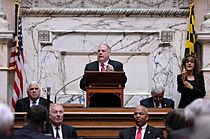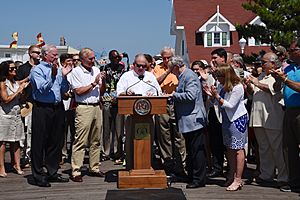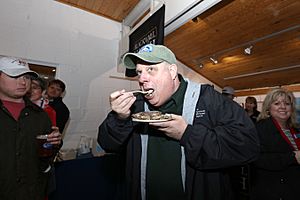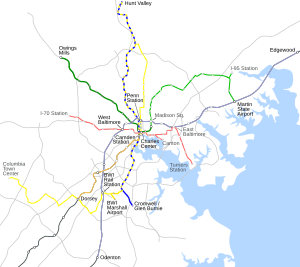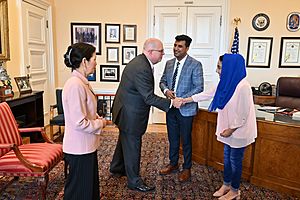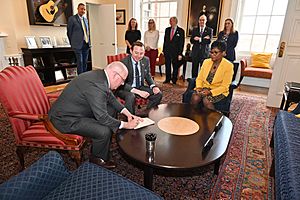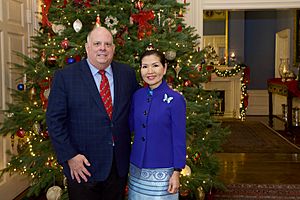Larry Hogan facts for kids
Quick facts for kids
Larry Hogan
|
|
|---|---|
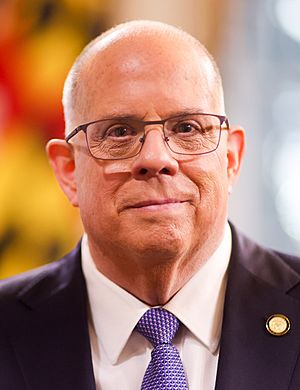
Hogan in 2021
|
|
| 62nd Governor of Maryland | |
| In office January 21, 2015 – January 18, 2023 |
|
| Lieutenant | Boyd Rutherford |
| Preceded by | Martin O'Malley |
| Succeeded by | Wes Moore |
| Chair of the National Governors Association | |
| In office July 26, 2019 – August 5, 2020 |
|
| Deputy | Andrew Cuomo |
| Preceded by | Steve Bullock |
| Succeeded by | Andrew Cuomo |
| Vice Chair of the National Governors Association | |
| In office July 21, 2018 – July 26, 2019 |
|
| Preceded by | Steve Bullock |
| Succeeded by | Andrew Cuomo |
| Secretary of Appointments of Maryland | |
| In office January 15, 2003 – January 17, 2007 |
|
| Governor | Bob Ehrlich |
| Preceded by | Position established |
| Succeeded by | Jeanne Hitchcock |
| Personal details | |
| Born |
Lawrence Joseph Hogan Jr.
May 25, 1956 Washington, D.C., U.S. |
| Political party | Republican |
| Spouse |
Yumi Kim
(m. 2004) |
| Parent |
|
| Relatives | Patrick N. Hogan (half-brother) |
| Education | Florida State University (BA) |
| Signature | |
Lawrence Joseph Hogan Jr. (born May 25, 1956) is an American politician and businessman who served as the 62nd governor of Maryland from 2015 to 2023. A member of the Republican Party and son of three-term congressman Lawrence Hogan, he also served as chair of the National Governors Association from 2019 to 2020.
Hogan unsuccessfully campaigned for Maryland's 5th congressional district in 1981 and 1992, the latter of which was incumbent Steny Hoyer's closest race. He then served in the cabinet of governor Bob Ehrlich from 2003 to 2007 as Maryland Secretary of Appointments. In 2011, Hogan founded the Change Maryland organization, which he used to promote his 2014 gubernatorial campaign. He campaigned as a moderate Republican and defeated Democrat Anthony Brown in the 2014 general election. He was reelected in 2018, defeating Democrat Ben Jealous, to become Maryland's first two-term Republican governor since Theodore McKeldin. He was term limited from running for a third term in 2022 and was succeeded as governor by Democrat Wes Moore. Hogan left office as one of the most popular governors in the country.
After leaving office, Hogan was initially seen as a likely contender for the Republican nomination for president of the United States in the 2024 presidential election but he has declined to seek the nomination. He is reportedly considering running in the election as a third party candidate.
Contents
Early life, family, and education
Hogan was born in 1956 in Washington, D.C., and grew up in Landover, Maryland, attending Saint Ambrose Catholic School and DeMatha Catholic High School. He moved to Florida with his mother after his parents divorced in 1972 and graduated from Father Lopez Catholic High School in 1974. Hogan is the son of Nora (Maguire) and Lawrence Hogan Sr., who served as U.S. Representative from Maryland's 5th congressional district from 1969 to 1975 and as Prince George's County executive from 1978 to 1982. Hogan Sr. was the first Republican member of the U.S. House Judiciary Committee to call for Richard Nixon's impeachment. His parents were both of Irish descent.
Hogan attended Florida State University from 1974 to 1978 and earned a Bachelor of Arts degree in government and political science.
Early career
As the son of a U.S. representative, Hogan was exposed to politics at a young age and worked in many aspects of politics, including political campaigns and citizen referendums.
While in college, Hogan worked in the Florida legislature. Upon graduation, he worked on Capitol Hill. Hogan helped his father run a successful campaign in 1978 for Prince George's County executive and later worked for him as a low-paid "intergovernmental liaison".
In 1981, at age 24, Hogan first ran for office in the special election to fill the vacancy in Maryland's 5th congressional district left by Gladys Noon Spellman. Spellman had succeeded Hogan's father in the office. Hogan finished second out of 12 candidates in the Republican primary with 22% of the vote, behind Bowie Mayor Audrey Scott's 63%.
In 1985, Hogan founded Hogan Companies, which is engaged in brokerage, consulting, investment and development of land, commercial and residential properties. He spent the next 18 years in the private sector.
In 1992, Hogan was the Republican nominee for Maryland's 5th congressional district, running against Democratic incumbent Steny Hoyer. Hoyer outspent Hogan by a 6-to-1 margin. The race was the closest in Hoyer's tenure. Hogan won four of the district's five counties and 44% of the vote to Hoyer's 53%, with William Johnston (Independent) at 3%.
Hogan took a four-year leave of absence from his business to serve as Maryland's secretary of appointments in Bob Ehrlich's administration from 2003 to 2007. In this capacity, Hogan appointed over 7,000 people to positions in the Maryland government.
In 2011, Hogan founded Change Maryland, a nonprofit anti-tax advocacy organization that was used to criticize Governor Martin O'Malley's administration. The organization promoted Hogan's gubernatorial run, and his campaign eventually purchased its assets. The Maryland Democratic Party alleged that Hogan had improperly received campaign benefits from the nonprofit; the State Board of Elections dismissed two of the complaints but found Hogan's campaign had not properly disclosed the value of a poll the nonprofit did before purchasing its assets.
2014 Maryland gubernatorial campaign
Hogan began his campaign for governor of Maryland on January 21, 2014. On January 29, 2014, he announced former Maryland secretary of general services Boyd Rutherford as his running mate. On June 24, 2014, Hogan and Rutherford won the Republican primary with 43% of the vote. ..... In the November 4 general election, they defeated Anthony Brown, the Democratic nominee and incumbent lieutenant governor, 51% to 47%. Hogan is the first governor to be elected from Anne Arundel County in over 100 years.
Governor of Maryland
Media outlets have called Hogan a moderate Republican and a "pragmatist". In 2015, The Washington Post's editorial board wrote that he was "true to his promise to govern from the center in the first legislative session of his term." On the Issues, a nonprofit and nonpartisan organization that tracks politicians' positions, considers Hogan a centrist. In a 2022 Morning Consult poll, Hogan was listed as the third-most popular governor in the United States, with a 70% approval rating. Despite his popularity, Hogan had no coattail effect on any downballot races in Maryland, with Democrats expanding their legislative supermajority and picking up several county-level seats during his tenure.
As governor, Hogan had a more hands-off approach to legislating, having never testified for any of the bills he proposed each year, unlike previous governors. He left office with few legislative accomplishments, but defended his approach to legislating by saying that he "never intended to enact a bunch of policies". Hogan frequently vetoed bills passed by the Maryland General Assembly, which was controlled by a Democratic supermajority during his entire tenure as governor, meaning that legislative leaders had to ensure bills passed by veto-proof majorities and had to schedule enough time for the legislature to override his vetoes on priority bills.
In the 2018 gubernatorial election, Hogan faced Democratic nominee Ben Jealous, a former NAACP president. Hogan enjoyed significant polling and fundraising leads over Jealous throughout the campaign. He defeated Jealous, 55% to 43%, becoming only the second Republican governor in Maryland history to be reelected, and the first since Theodore McKeldin in 1954. Hogan won the most votes of any governor in Maryland history.
Hogan served as vice chair of the National Governors Association (NGA) from 2018 to 2019 and as chair from 2019 to 2020. In 2019, Hogan raised the possibility of running for president in 2020, but he later decided not to run. In June, he addressed the Maryland Free Enterprise Foundation, a business advocacy group, in a combative speech, "skewering Democrats who control the state legislature and vowing to spend the remainder of his term in 'battle' with them." Hogan promised to work against tax increases.
Between taking office and February 2017, Hogan's Facebook page blocked over 450 people. One spokesman said about half had used "hateful or racist" language, while the rest were part of a "coordinated attack". Affected Marylanders said they had reached out to the governor via Facebook after the 2015 Baltimore protests as well as Donald Trump's Executive Order 13769 in January 2017, which banned travelers from seven predominantly Muslim countries.
In March 2017, it was discovered that Hogan staffers altered headlines of The Baltimore Sun and DelmarvaNow articles posted on his Facebook page to falsely imply General Assembly support for Hogan's so-called "Road Kill Bill". After the Sun contacted Hogan's office about the doctored headlines, the office rectified the problem.
Education
As governor, Hogan voiced support for expanding charter schools in the state by loosening the state's charter school laws. In February 2015, he announced proposed regulatory changes to the state's charter law, including provisions that would give charter schools more authority over hiring and firing practices and setting admissions criteria, and increasing access to public funding. The Maryland legislature approved and passed a watered-down version of Hogan's proposals, which was signed into law on May 12, 2015. During the 2016 legislative session, Hogan and the Maryland General Assembly agreed to create a state-funded private-school scholarship program to provide assistance to students from low-income families that attend charter schools. In December 2016, Hogan proposed doubling funding for the state program. In 2017, he again proposed changes to the state's charter laws, which was met with pushback from legislative leaders and teacher unions.
In 2013, a bipartisan commission studied whether to move the start of the school year after Labor Day and voted 12–3 to recommend such a measure to then Governor Martin O'Malley. In August 2016, Hogan issued an executive order to set the public schools start date after Labor Day. The measure was opposed by the state teachers' union, the Maryland State Education Association (MSEA).
In early 2017, Hogan proposed a budget that cut funding for community revitalization programs, extended library hours, and public schools in Baltimore City. Under the proposed budget, Baltimore City Public Schools would receive $42 million less than the prior year, further exacerbating the $129 million budget gap. In February 2017, in response to the funding crisis, citizens rallied in Annapolis. Hogan has criticized the school system for the mismanagement of funds, and has deemed the system's finances an "absolute disaster". In January 2019, he released a budget that focused mostly on education funding, above what current state formulas require.
In May 2018, Hogan signed a bill appropriating $15 million in need-based scholarships for low- and middle-income students, allowing them to attend community college tuition-free, and appropriating an additional $2 million over a five-year period for older "near-completer" college students who are close to earning degrees at community colleges or four-year colleges.
In August 2019, Hogan said that he would veto any proposed tax increase to pay for the Blueprint for Maryland's Future, a proposed multi-billion-dollar plan to implement a series of education reforms recommended by the Commission on Innovation and Excellence in Education. In May 2020, Hogan vetoed the Blueprint for Maryland's Future, citing the massive hit on Maryland's economy from the COVID-19 pandemic. This veto also blocked the implementation of the Build to Learn Act, a bill that would have provided $2.2 billion in extra funding for school construction that contained a provision preventing it from going into effect until the Kirwan bill became law. On February 12, 2021, the Maryland General Assembly voted to override Hogan's veto of the Kirwan bill. General Assembly leaders also introduced a separate bill to adjust the implementation timeline of the Blueprint to account for Hogan's veto, which passed and became law without Hogan's signature.
Environment
In February 2015, Hogan announced proposed regulatory changes on phosphorus nutrient pollution in the Chesapeake Bay and the Eastern Shore of Maryland. The water was being polluted as a result of agricultural runoff of chicken manure, which farmers use as fertilizer and is cheap and plentiful in Maryland. Hogan proposed extending the time for about 80% of farmers to fully comply with regulations to 2022, while at the same time imposing a ban on additional phosphorus use by the largest farmers and providing for indefinite delays if there was no other use for the manure. In March 2015, Hogan reached a compromise with Democrats in the General Assembly under which a hard date of 2022 was established, subject to a delay to 2024 if no alternative uses for the manure can be found. The compromise "received tentative praise from both the agricultural community and environmentalists."
In 2016, Hogan signed legislation to reauthorize greenhouse gas reduction targets and mandate a 40% reduction in statewide carbon pollution by 2030. In 2017, Hogan vetoed legislation passed by the Maryland General Assembly to increase the use of renewable energy by setting a renewable portfolio standard to require that 25% of the state's electricity come from renewable sources (such as solar, wind, and hydroelectricity) by 2020. Hogan and the Maryland Republican Party led an unsuccessful campaign to sustain the veto, but the Democratic-controlled General Assembly overrode it on party lines. In April 2022, Hogan refused to veto or sign a bill that accelerated these efforts, allowing the bill to become law without his signature.
In April 2017, Hogan signed a law banning hydraulic fracturing in Maryland. But he supported pipelines in Maryland that transport natural gas obtained by hydraulic fracturing in other states, including the Eastern Shore Pipeline. In June 2017, Hogan maintained support for the Paris Agreement and opposed the United States withdrawal from the Paris Agreement. In January 2018, he said Maryland would join the United States Climate Alliance formed by California, New York, and Washington. In 2016, Hogan vetoed the Baltimore Red Line light rail project, which had been awarded federal money, and shifted these funds into road construction. With transportation responsible for 30% of U.S. emissions, Hogan has not articulated a vision of how the U.S. could achieve the Paris Agreement's goals without changes in transportation investments. Critics have said that his funding of roads is reflective of his business interests or racial politics rather than his position on environmental regulation.
In November 2021, the Maryland League of Conservation Voters deemed Hogan's environmental leadership inconsistent in its annual legislative scorecard.
In March 2022, Hogan threatened to veto the Climate Solutions Now Act, an omnibus bill to reduce greenhouse gas emissions by 60% by 2031, calling it a "reckless and controversial energy tax", even though the bill contained no tax increases. The bill passed and became law without his signature.
Transportation
In June 2015, Hogan canceled the federally funded Baltimore Red Line project, instead choosing to reallocate money to road construction across Maryland, fulfilling a 2014 campaign promise. Maryland Transportation Secretary Pete Rahn called the Red Line proposal "fatally flawed" and argued that the light rail line would not connect with other public transportation hubs in Baltimore and would require the construction of a $1 billion tunnel through the heart of the city. But plans detailed that the Red Line would connect to the MARC Train at the West Baltimore station and planned Bayview station, the Baltimore Metro Subway at Charles Center station via a pedestrian tunnel, as well as with the Baltimore Light Rail at the University Center/Baltimore Street station at street level. Baltimore Mayor Stephanie Rawlings-Blake criticized the project's cancellation. In May 2022, Hogan vetoed bills that would establish a Baltimore-based regional transit board and to fund a new study of the Red Line project.
Hogan conditionally approved funding for the Purple Line in Maryland's Washington, D.C. suburbs, subject to increased contributions from Montgomery County and Prince George's County. This 2017 decision closed down popular bike paths in Montgomery County for what the state Department of Transportation estimates will be five years (ending in 2022), triggering residents' anger and protests.
In 2016, the Maryland General Assembly introduced HB 1013, the Maryland Open Transportation Investment Decision Act of 2016, which aimed to establish statewide transportation goals through a transparent scoring process by the Maryland Department of Transportation. Inspired by Hogan's decision to cancel the Baltimore Red Line and shift funding to rural areas of the state, the legislation would require the Transportation Department to develop a project-based scoring system and promulgate regulations for the public. In April 2016, Hogan vetoed the bill, saying that it was politically motivated and would increase the cancellation risk for major transportation projects throughout the state. He said that the bill would force him to cancel 66 transportation projects and called it the "Road Kill Bill". Hogan did not explain why he considered the measure politically motivated. A prior investigation by the U.S. Department of Transportation revealed that the decision to cancel the red line was made unilaterally by his office without consulting the Maryland Department of Transportation. The General Assembly overrode Hogan's veto on April 8, 2016. Hogan deemed repealing the legislation to be his top priority, but gridlock and tension between him and the legislature prevented an alternative solution from being reached. In May 2019, The Baltimore Sun reported that transit advocates had accused the Hogan administration of using a biased scoring process in which administration-supported projects (such as the Beltway expansion plan) receive high scores and disfavored ones (such as the Baltimore Red Line) receive low scores. One critic cited in the piece said, "The General Assembly passed this law in an attempt to be more open and transparent...MDOT has complied with the law to the minimum extent possible...Projects they want to fund get perfect scores and projects they don't want to fund get low scores. It doesn't pass the smell test that they're faithfully executing this law."
During his second term, Hogan made efforts to expand the Maryland sections of the Capital Beltway (Interstate 495) and Interstate 270 by proposing a plan to add up to two high-occupancy toll lanes (referred to critically as "Lexus lanes") on each highway in each direction, arguing that the project would reduce traffic congestion. The proposal was highly controversial, and was opposed by a number of planners and officials, including the Prince George's County Council, Montgomery County Executive Marc Elrich, and local citizens' organizations such as Citizens Against Beltway Expansion. The only poll on the subject of the Beltway expansion plan showed that in principle, 61% support the toll road, but 73% were very or somewhat concerned about the loss of homes, 69% very or somewhat concerned that the road would be too expensive to use, and 68% were very or somewhat concerned that the new highway would not reduce congestion. The plan's cost also has risen from $9 billion to $11 billion since it was first made public, an amount that the Hogan administration says will be paid for entirely by private contractors.
On May 8, 2019, the Prince George's County Council voted unanimously for a proposal requiring Hogan to undertake further environmental reviews before proceeding with the plan. On June 5, the State Board of Public Works (composed of Hogan, State Comptroller Peter Franchot, and State Treasurer Nancy Kopp) voted to approve the proposal. Hogan and Franchot voted in favor of it, Kopp against.
In August 2021, the Maryland Board of Public Works voted to accept a contract that would allow an international consortium to begin design work on the plan to add privately financed toll lanes to portions of the Beltway and I-270, with Hogan and Franchot voting to approve the plans and Kopp voting against it. A second contract, which set up a one-dollar-a-year lease arrangement over 60 years between the Maryland Department of Transportation and the Maryland Transportation Authority, was also agreed upon. On November 19, 2021, the Maryland Transportation Authority Board voted unanimously to approve toll rates on Interstate 270, with prices depending on whether drivers use EZ-Pass or video tolling, the driver's vehicle and amount of passengers, and if drivers commute during hours where traffic is especially acute.
Some consider these decisions contradictory to Hogan's stated support for the Paris Climate accord. He has also been accused of seeking to advance his business interests through his position.
COVID-19 pandemic
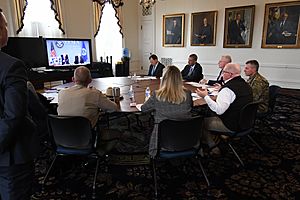
Hogan declared a state of emergency on March 5, 2020, after three Montgomery County residents tested positive for COVID-19. The emergency declaration allowed public health experts and emergency management officials to coordinate more with state and local leaders to handle the virus. Hogan also filed a supplemental budget requesting $10 million to fund an emergency response to the virus. The Maryland Senate unanimously approved Hogan's budget request on March 12, 2020.
On March 12, 2020, Hogan ordered the closure of all public schools in the state starting March 16 and ending March 27 to allow for the cleaning and disinfecting of school buildings to prevent the virus's spread. He signed an executive order activating the Maryland Army National Guard and moving the Maryland Emergency Management Agency's activation level to its highest level of readiness, and another prohibiting all social, community, religious, recreational and sports gatherings of more than 250 people in close proximity. He mandated remote work by all nonessential state employees, directed hospitals to adopt new visitor policies, suspended visits at state prisons, limited public access to state buildings, and closed all senior living facilities until the state was no longer under a state of emergency. Hogan signed another executive order a few days later ordering the closure of all Maryland casinos, racetracks, and simulcast betting facilities until the state of emergency expired.
As cases continued to rise, Hogan signed another executive order suspending on-site bar and restaurant services, closing movie theaters and gyms, and banning gatherings of more than 50 people. Non-compliant businesses and individuals were fined $5,000 or received a year in jail. From March 23 to April 19, Hogan signed a series of executive orders aimed at reducing the virus's spread, including an eviction and utility shut-off moratorium, closures of nonessential businesses, a stay-at-home order, and an extension for all expiring identity documents. He used coronavirus "strike teams", made up of the National Guard, state and local health departments and hospital systems, to provide emergency care, supplies and equipment to nursing homes to combat coronavirus case outbreaks.
As hospitalization rates began to stabilize, Hogan announced that the state would begin formulating a plan to roll back coronavirus restrictions and gradually reopen the economy, beginning with a mask mandate on April 15, 2020. On April 24, he unveiled the state's three-stage plan for reopening the state's economy, with the first step involving lifting the state's stay-at-home order. Hogan lifted the stay-at-home order on May 13, after a two-week decline in hospitalizations statewide, and continued the rest of the state's first stage of reopening on May 27. He began the second stage of reopening on June 5, by reopening certain businesses and personal services at 50% capacity.

On April 20, 2020, Hogan announced that the state had brokered a $10 million deal with South Korea to acquire 500,000 COVID-19 tests after weeks of negotiations in a confidential project called Operation Enduring Friendship. Upon their delivery, he deployed members of the state's National Guard and the state police to supervise the testing kits at an "undisclosed location" after reports of federal officials seizing supplies delivered to other states. Citing apparent reliability problems, the University of Maryland lab in Baltimore stopped using these test kits in September 2020, replacing the tests with ones developed by the U.S. Centers for Disease Control and Prevention. It was later revealed that the acquired tests had been flawed and were left unused, which led the Hogan administration to acquire 500,000 replacement tests from the same company it had originally purchased test kits from for $2.5 million. Acting Maryland Secretary of Health Dennis Schrader acknowledged the Hogan administration's replacement of its test kits in December 2020. In May 2021, Hogan vetoed a bill that would create greater transparency in emergency procurements that had passed the state House of Delegates and the Senate in a 131–1 and 47–0 vote, respectively. An audit conducted by the Maryland Office of Legislative Audits found that over $190 million in pandemic-related emergency purchases made by state agencies, including the procurement of the South Korean company LabGenomics test kits, lacked appropriate records.
In July 2020, as hospitalization rates began to rise again, Hogan issued a new statewide mask mandate, advised Maryland residents against traveling to states with a positivity rate of 10% or higher, and extended the state's eviction and utility shut-off moratorium. On August 27, he announced that he had authorized every county school board system to begin safely reopening schools, citing improved coronavirus metrics. A few days later, he announced that the state would proceed with the third stage of its reopening plan on September 4 by reopening casinos, theaters, and concert venues. Hogan gave 16 community colleges a $10 million grant in September 2020 to assist people impacted by the pandemic, and later unveiled a $500 million economic relief package to help Maryland business owners recover.
Hogan renewed the state's coronavirus state of emergency declaration on October 31 and its state travel advisories on November 5, 2020, after a sudden increase in COVID-19 cases across the state. He also reintroduced capacity restrictions in public spaces and buildings in order to reduce the virus's spread. As Maryland reached 200,000 confirmed COVID-19 cases, Hogan activated the Maryland Medical Reserve Corps and allowed medical and nursing students to help staff the state's testing and vaccination sites. He later implemented new gathering and travel restrictions as cases continued to soar.
On December 8, 2020, Hogan announced that Maryland would receive its first batch of COVID-19 vaccines by December 14 and laid out a four-phase plan for who would receive the first doses. His administration opened mass vaccination sites across the state, starting with Six Flags America and the Baltimore Convention Center in February 2021. Hogan opened 12 mass vaccination sites by the end of April 2021 and worked with the Federal Emergency Management Agency to deploy the first federal mobile COVID-19 vaccination sites on the Eastern Shore of Maryland. In February 2021, Hogan signed into law a bill providing tax relief for families and businesses struggling with the pandemic and distributing direct payments of $500 to families and $300 to low-income individuals.
Hogan signed an executive order lifting the state's restrictions on restaurants, retail businesses, religious facilities, casinos, and social gatherings on March 12, 2021, but kept social distancing and mask mandate requirements in place. A few weeks later, he announced plans to initiate the start of the final phases of Maryland's vaccine distribution plan, with the second stage starting on March 30 and the third stage on April 27, 2021. Hogan signed an executive order lifting the outdoor mask mandate and dining restrictions on April 28, 2021, and lifted all remaining COVID-19 related restrictions on May 15. On June 15, he announced that he would not renew the state's coronavirus emergency declaration when it expired on July 1. He later signed a proclamation keeping the conditions of the emergency declaration in place through August 15, 2021.
On June 1, 2021, Hogan announced that on July 3 he would join two dozen other Republican governors in ending the $300 supplemental weekly unemployment insurance provided by the American Rescue Plan Act of 2021. A judge temporarily halted the Hogan administration's plans to end unemployment benefits early before eventually blocking the decision altogether. The Maryland Court of Appeals dismissed Hogan's appeal of the ruling, and Circuit Court Judge Lawrence Fletcher-Hill issued a preliminary injunction blocking the Hogan administration from terminating federal unemployment assistance.
In August 2021, Hogan issued a vaccine mandate requiring all hospital and nursing home workers to get a COVID-19 vaccine by September 1, 2021, or receive weekly testing.
In September 2021, Hogan authorized COVID-19 booster shots for nursing home residents and immunocompromised residents. In November 2021, booster shot eligibility was expanded to all Maryland adults.
Roy McGrath incident
Roy McGrath was Hogan's chief of staff for two months in 2020, until The Baltimore Sun broke news of a $233,647 severance he received in 2020 upon leaving the Maryland Environmental Service to take the chief of staff position. According to an affidavit obtained by the Baltimore Banner, Hogan was alerted of the payout by a board member of the Maryland Environmental Service on August 2, 2020. He called McGrath into his office the next day to discuss the payout, but did not take any action until The Sun article was released. Hogan maintained that he did not know about the severance payment, and ordered an audit of the Maryland Environmental Service following his resignation. McGrath was facing wire fraud and embezzlement charges and became a fugitive when he failed to show up to federal court in Baltimore in a trial wherein Hogan was to be called as a witness. McGrath died on April 3, 2023, after receiving a gunshot wound in a confrontation with FBI agents in Knoxville, Tennessee, that day.
Gun control
In October 2018, a law tightening gun control regulations that Hogan signed went into effect. The law banned bump stocks and gun ownership by convicted domestic abusers. Hogan was endorsed by the NRA Political Victory Fund (NRA) in 2014, but in July 2018, he said he would decline an endorsement and funds from the NRA if they were offered. In September 2018 the NRA downgraded its rating of Hogan to "C" and declined to endorse him.
On May 24, 2019, Hogan vetoed a bill to replace the state Handgun Permit Review Board with a panel of judges. The Handgun Review Board hears appeals from Marylanders whose applications for handgun permits were denied by the Maryland State Police. Critics accused it of being too lenient in granting appeals. Hogan condemned the bill as a "solution in search of a problem."
In April 2022, Hogan refused to veto or sign a bill that would ban the sale and possession of privately made firearms, known as ghost guns, allowing the bill to become law without his signature. He vetoed legislation that would require gun shops to have increased safety measures, including 24-hour burglary alarm systems and anti-vehicle barriers. The General Assembly overrode Hogan's veto the next day.
In July 2022, Hogan directed the Maryland State Police to end the "good and substantial" reasoning standard when issuing carry permits. The order was issued a few weeks after the U.S. Supreme Court declared a similar provision in New York unconstitutional in NYSRPA v. Bruen.
Immigration
After the November 2015 Paris attacks, Hogan asked that the federal government "cease any additional settlement programs of Syrian refugees in Maryland until the U.S. government can provide appropriate assurances that refugees from Syria pose no threat to public safety." He opposed President Donald Trump's decision to end the Deferred Action for Childhood Arrivals (DACA) program. He recalled Maryland National Guard forces from the U.S.–Mexico border to protest the Trump administration family separation policy.
In May 2021, Hogan vetoed a bill passed by the General Assembly that would require counties that have contracts with Immigration and Customs Enforcement to end their contracts by October 1, 2022. The General Assembly overrode the veto during its 2021 special session.
In August 2021, Hogan announced that Maryland would be "ready and willing" to accept additional Afghan refugees. The state took in 1,348 Afghan refugees amid the evacuation.
Israel
Hogan is pro-Israel. In October 2017, Hogan signed an executive order requiring firms that have state contracts to promise they will not boycott Israel. In January 2019, the Council on American-Islamic Relations sued Hogan and Attorney General Brian Frosh on behalf of Saqib Ali, a former member of the House of Delegates, challenging the executive order under the First and Fourteenth Amendments to the United States Constitution. In October 2020, U.S. District Judge Catherine Blake refused to block the executive order.
Redistricting
In May 2017, Hogan vetoed a bill that would have enacted nonpartisan redistricting in Maryland if New York, New Jersey, Pennsylvania, Virginia, and North Carolina all passed the same deal.
In January 2018, Hogan signed an amicus brief filed by former California Governor Gray Davis in the Supreme Court case Benisek v. Lamone, arguing that Maryland's partisan gerrymandering system violates voters' constitutional rights.
In January 2021, Hogan signed an executive order establishing the Maryland Citizens Redistricting Commission (MCRC), which consisted of three Republicans, three Democrats, and three independent voters, in an effort to resolve a gerrymandering issue in the state. The commission would be in charge of creating legislative maps. It held 36 meetings and opened an online mapping application portal for the public to give input into the redistricting process before submitting its final maps on November 4, 2021. Hogan accepted the commission's final map the following day, sending it to the Maryland General Assembly for consideration during a special session on December 6, 2021. He also threatened a legal battle against any maps the General Assembly passed over his veto that he considered unfair. During its 2021 special session, the House Rules Committee did not vote on the commission's maps, instead passing its own map, drawn by the Legislative Redistricting Advisory Committee (LRAC), by a vote of 18–6. The General Assembly rejected amendments that would have swapped out the LRAC proposal with the maps drawn by the MCRC, and sent its maps to Hogan on December 8. Hogan vetoed the LRAC proposal on December 9. The General Assembly overrode his veto the same day. After Judge Lynne A. Battaglia struck down the legislature's maps in March 2022, Hogan issued a statement celebrating the ruling and calling on the General Assembly to enact the MCRC map. The General Assembly again drew its own map a few days later, which passed and was signed into law by Hogan on April 4, 2022, after legislative leaders dropped their appeal of Battaglia's ruling.
Sick-leave and paid family leave
In December 2016, Hogan proposed state legislation to require companies with 50 or more employees to provide five days per year of paid sick leave. Hogan's bill was less expansive than legislation passed by the Maryland House of Delegates; it would also have preempted local legislation that was more generous to employees, such as mandated paid sick leave required by Montgomery County, Maryland. In the legislature, Hogan's proposal failed to advance out of committee, and the House of Delegates passed more expansive legislation that requires companies with 15 employees or more to provide seven paid sick-leave days a year, requires companies with fewer than 15 employees to provide five days of unpaid sick leave, and affords benefits for part-time employees. Hogan vetoed the more generous bill, but his veto was overridden.
In April 2022, Hogan vetoed a bill that would provide 12 weeks of partially paid family leave and up to 24 weeks of paid leave for new parents. The General Assembly overrode Hogan's veto the next day.
Social issues
..... "Our laws in Maryland already guarantee a woman's right to choose," he said. "We have some very strong laws and any change in the Supreme Court would not affect Maryland, so I don't think that a constitutional amendment is required, but if that's what they want to do, I'm all for that. Let the voters decide." ..... The General Assembly overrode his veto the next day.
.....
In 2014, Hogan opposed a transgender rights law signed by Governor Martin O'Malley. As a gubernatorial candidate, he said that he was "originally for civil unions" but that he has evolved to support same-sex marriage. In 2015, Hogan expanded an executive order to include protections for gender identity among "executive branch employees." He neither signed nor vetoed a 2015 bill that allowed transgender Marylanders to change the gender listed on their birth certificates, allowing the bill to become law without his signature.
..... The General Assembly overrode the veto.
In May 2018, Hogan signed legislation into law making Maryland the 11th state to ban conversion therapy for minors.
.....
In June 2021, Hogan refused to veto or sign a bill banning the use of the gay panic defense and another bill creating the Commission on LGBTQ Affairs in the Governor's Office of Community Initiatives. As a result, both laws went into effect without his signature on October 1, 2021.
.....
National politics
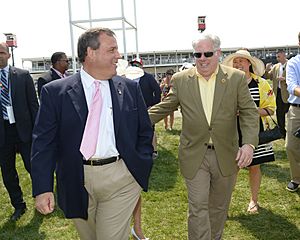
On July 15, 2015, Hogan endorsed New Jersey Governor Chris Christie in his campaign for the Republican nomination for president. In June 2016, Hogan said he had no plans to support Donald Trump, the Republican Party's presumptive nominee. Instead, on election day, Hogan wrote in his father, Lawrence Hogan, for president. He later attended Trump's inauguration. During Trump's administration, Hogan mixed criticism of Trump (including a suggestion that the Republican Party should reorient itself away from Trump) with praise for Trump in economic and public health matters.
In his January 2019 inaugural address, Hogan hinted he was considering launching a Republican primary challenge to Trump in the 2020 presidential election. In March 2019, Hogan said he was listening to many who were encouraging him to challenge Trump and would not rule it out. In an April 2019 event in New Hampshire, Hogan said he intended to give "serious consideration" to a primary challenge to Trump. Polls conducted in April and May 2019 suggested Hogan would receive the votes of 24% of Republican voters against 68% for Trump in the Maryland Republican primary. In June 2019, Hogan announced that he would not challenge Trump in the 2020 Republican primaries in order to focus on governing Maryland and chairing the National Governors Association. Shortly afterward, Hogan said he had no interest in running for the U.S. Senate in 2022, but left open the possibility of running for president in 2024. He also launched An America United, a national advocacy group that is also intended to raise Hogan's profile and give him a voice on the national level.
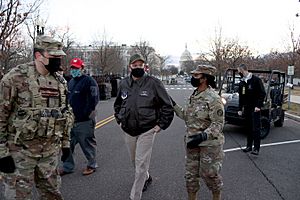
In October 2019, Hogan announced his support for the U.S. House of Representatives' impeachment inquiry against Trump. In February 2020, after Trump was impeached and acquitted by the Senate, Hogan criticized Congress, saying that House Democrats "had already decided before the hearings that the president should be impeached" and that Senate Republicans were going to acquit Trump "no matter what the facts were". In September 2020, Hogan endorsed U.S. Senator Susan Collins for reelection. In November 2020, he announced his support for Senators David Perdue and Kelly Loeffler in the January 2021 runoff elections in Georgia.
In August 2020, during an interview on the Maryland response to the COVID-19 pandemic, Hogan said that he was unenthusiastic about Trump and the Democratic nominee, Joe Biden, but said it was conceivable that his vote could be swayed by either candidate before election day. He ultimately stated that he wrote in a vote for late President Ronald Reagan.
In December 2020, Hogan was announced as the national co-chair of No Labels, a centrist political organization.
In January 2021, in response to the storming of the U.S. Capitol by a pro-Trump mob, Hogan sent in the Maryland National Guard to protect the Capitol, after initially being denied permission multiple times. Shortly after the attack, Hogan said, "I think there's no question that America would be better off if the president would resign or be removed from office." He supported Trump's impeachment for incitement of insurrection and said that, had he been in the Senate, he would have voted to convict Trump and remove him from office. Hogan later ordered the Maryland National Guard to aid in protecting the inauguration of Biden.
In August 2021, Hogan applauded the passage of the Infrastructure Investment and Jobs Act in the Senate and thanked his Senate partners for including every recommendation the National Governors Association made. He also criticized Trump and other Republicans for targeting the 13 House Republicans who voted for the act.
In November 2021, after the House of Representatives passed the Build Back Better Act, Hogan issued a statement urging the Senate to reject the bill.
Despite initial speculation, Hogan announced in 2023 that he would not seek the Republican nomination for president in 2024. However, Hogan later said he had not ruled out running as a third-party candidate should the 2024 election become a rematch of the 2020 election between Trump and Biden. Such a third-party bid would likely be as a candidate of No Labels, which Hogan said has "raised about $50 million to get [ballot] access in all 50 states as kind of an insurance policy".
2022 gubernatorial election
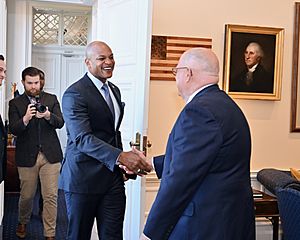
As Hogan was term-limited, he did not run in the 2022 gubernatorial election. In November 2021, he endorsed the campaign of his commerce secretary, Kelly Schulz. After Schulz lost the Republican primary to state delegate Dan Cox, who was much farther to the right than the generally centrist Hogan, he said that he would not support Cox in the general election. Hogan blamed "collusion" between the Democratic Governors Association (DGA) and former president Donald Trump for Cox's primary win. According to The New York Times, the DGA spent over $1.16 million on television advertisements promoting Cox, who was endorsed by Trump. Hogan also criticized Democrats for "emboldening" Cox, who Hogan called a "QAnon conspiracy theorist", and likened their efforts to "play[ing] Russian roulette with the Maryland statehouse". Hogan declined to say who he voted for in the general election. After the election, he congratulated governor-elect Wes Moore. Hogan delivered his farewell address as governor on January 10, 2023. His term expired on January 18.
Personal life
During his governorship, Hogan resided in Government House in Annapolis with his wife Yumi Hogan, a Korean-origin U.S. citizen who is an artist and adjunct instructor at Maryland Institute College of Art. The couple met in 2001 and married in 2004. Hogan and his wife are Roman Catholic. Hogan is the stepfather of Yumi's three adult daughters from her first marriage: Kim Velez, Jaymi Sterling, and Julie Kim. Sterling has served as State Attorney for St. Mary's County since 2023. Hogan's half-brother, Patrick N. Hogan, represented a district in Frederick County, Maryland in the Maryland House of Delegates from 2003 to 2007 and 2011 to 2015.
In June 2015, Hogan announced that he had been diagnosed with stage-three non-Hodgkin lymphoma and was undergoing treatment. He completed 18 weeks of chemotherapy and announced in November 2015 that the cancer was in remission. He underwent his last chemotherapy treatment in October 2016 and was deemed cancer-free. In January 2021, Hogan underwent surgery to remove early stage squamous cell skin cancer from his face and shoulder, a repeat of similar surgery he had in 2018.
In 2021, Hogan purchased a home and estate for $1.1 million in Davidsonville, Maryland.
Electoral history
| Party | Candidate | Votes | % | |
|---|---|---|---|---|
| Republican | Audrey Scott | 8,750 | 63.21 | |
| Republican | Larry Hogan | 3,095 | 22.36 | |
| Republican | John Lillard | 1,139 | 8.23 | |
| Republican | Jean Speicher | 236 | 1.70 | |
| Republican | David Elliot | 215 | 1.55 | |
| Republican | Jon William Robinson | 101 | 0.73 | |
| Republican | Woodworth Watrous | 79 | 0.57 | |
| Republican | George Benns | 72 | 0.52 | |
| Republican | Frederick Taylor | 66 | 0.48 | |
| Republican | Irvin Henson Jr. | 40 | 0.29 | |
| Republican | Jack Price | 25 | 0.18 | |
| Republican | Robert Byron Brickell | 24 | 0.17 | |
| Party | Candidate | Votes | % | |
|---|---|---|---|---|
| Republican | Larry Hogan | 12,661 | 48.60 | |
| Republican | Gerald Schuster | 4,967 | 19.07 | |
| Republican | John Douglas Parran | 4,020 | 15.43 | |
| Republican | Theodore Henderson | 2,275 | 8.73 | |
| Republican | Michael Swetnam | 1,495 | 5.74 | |
| Republican | John Michael Fleig | 633 | 2.43 | |
| Party | Candidate | Votes | % | |
|---|---|---|---|---|
| Democratic | Steny Hoyer | 118,312 | 52.98 | |
| Republican | Larry Hogan | 97,982 | 43.87 | |
| Independent | William Johnston | 6,990 | 3.13 | |
| Independent | James McLaughlin | 40 | 0.02 | |
| Independent | Lisa Ashelman | 2 | 0.00 | |
| Party | Candidate | Votes | % | |
|---|---|---|---|---|
| Republican | Larry Hogan/Boyd Rutherford | 92,376 | 42.98 | |
| Republican | David R. Craig/Jeannie Haddaway | 62,639 | 29.14 | |
| Republican | Charles Lollar/Kenneth Timmerman | 33,292 | 15.49 | |
| Republican | Ron George/Shelley Aloi | 26,628 | 12.39 | |
| Party | Candidate | Votes | % | |
|---|---|---|---|---|
| Republican | Larry Hogan | 884,400 | 51.03 | |
| Democratic | Anthony Brown | 818,890 | 47.25 | |
| Libertarian | Shawn Quinn | 25,382 | 1.46 | |
| Party | Candidate | Votes | % | |
|---|---|---|---|---|
| Republican | Larry Hogan (incumbent) | 210,935 | 100.00% | |
| Total votes | 210,935 | 100.00% | ||
| Party | Candidate | Votes | % | |
|---|---|---|---|---|
| Republican | Larry Hogan | 1,275,644 | 55.4 | |
| Democratic | Ben Jealous | 1,002,639 | 43.5 | |
| Libertarian | Shawn Quinn | 13,241 | 0.6 | |
| Green | Ian Schlakman | 11,175 | 0.5 | |
See also
 In Spanish: Larry Hogan para niños
In Spanish: Larry Hogan para niños


